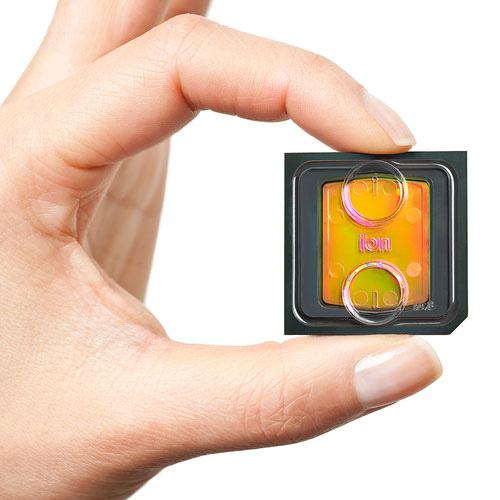The company expects to have the Ion Proton™ benchtop sequencer on the market by the middle of the year.
It looks like fulfilling the dream of the $1,000 genome may be just around the corner. Ion Torrent, a unit of Life Technologies, reports that it has begun taking orders for a novel instrument that will sequence the human genome in one day for $1,000 on a stand-alone server.
The company expects to have the Ion Proton™ benchtop sequencer on the market by the middle of the year. Costing $149,000, the product relies on the next generation of semiconductor sequencing technology that drives the operation of its Ion Personal Genome Machine™ (PGM™), which was introduced thirteen months ago. According to Andy Felton, senior director of product marketing for Ion Torrent, the Ion Proton I chip is key to the new instrument’s disruptive capabilities.
“We have moved away from optically based sequencing technologies to capitalize on the scalability of semiconductors,” he told GEN. “With the Ion PGM sequencer, we took light out of the equation and built our first chip with 1.2 million sensors. With the Ion Proton I Chip, we’ve scaled that technology to 165 million sensors, and that will grow to 660 million with the Ion Proton II Chip. We have gone from 100X scaling with the PGM to the next 100X scaling level with the Ion Proton sequencer.”

Ion Torrent’s Ion Proton I chip is the key component to the company’s new human genome sequencer.
Hundreds of Sequencing Experiments
As a result, scientists will be able to carry out hundreds of human genome sequencing experiments per year with each instrument compared to the current 20 per year per instrument, noted Felton, who added that up until now, researchers would spend weeks or months to sequence a single human genome.
“The research market is all about the iteration of biological experiments,” continued Felton. “The more you study something the better you understand it. To do this you need to turn experiments around quickly. What semiconductors allow you to do is to sequence in hours instead of weeks. Research and publication will be greatly accelerated with the Ion Proton sequencer.”
Turning to the clinical market, Felton explained that sequencing the genomes of large numbers of people is critical to gaining a better sense of what the genome contributes to various disease states.
“The current limitations to this kind of work have been the cost of the technology platform, the expense of sequencing itself, and the time to perform the sequencing operations,” said Felton. “The Ion Proton instrument will make sequencing less expensive, faster, and much simpler. Scientists will not only be able to learn more about human diseases, but the new system will help shed additional light on disease susceptibility and drug interactions.”
Of course, huge amounts of data will be generated from sequencing an increasing number of human genomes. To deal with the resultant tens or hundreds of millions of data points, Ion Torrent is collaborating with Carnegie Mellon to develop open-source software to assist clinicians in interpreting genetic data.
According to Ion Torrent, the Baylor College of Medicine, the Yale School of Medicine, and the Broad Institute, among others, have bought multiple Ion Proton sequencers.



